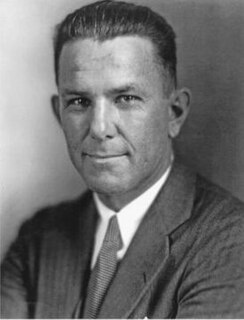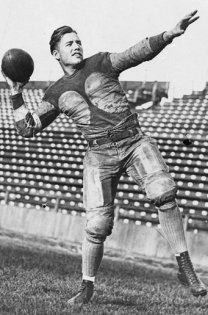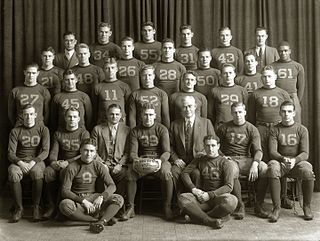Related Research Articles

Rogers Hornsby Sr., nicknamed "The Rajah", was an American baseball infielder, manager, and coach who played 23 seasons in Major League Baseball (MLB). He played for the St. Louis Cardinals, New York Giants (1927), Boston Braves (1928), Chicago Cubs (1929–1932), and St. Louis Browns (1933–1937). He was named the National League (NL)'s Most Valuable Player (MVP) twice, and was a member of one World Series championship team.

William Malcolm Dickey was an American professional baseball catcher and manager. He played in Major League Baseball with the New York Yankees for 19 seasons. Dickey managed the Yankees as a player-manager in 1946 in his last season as a player.

David Dale Alexander, nicknamed "Moose", was an American baseball player and manager.

Russell Loris Arlett, also known as Buzz Arlett, was an American baseball player, sometimes called "the Babe Ruth of the minor leagues." Like Ruth, Arlett was a large man, 6 feet 4 inches (1.93 m) and 230 pounds (100 kg), who began his career as a pitcher before becoming his league's dominant home run hitter. He was for many decades the all-time minor league home run king in the United States, until being surpassed by Mike Hessman on August 3, 2015. He spent one season with the Philadelphia Phillies of Major League Baseball (MLB).

Frank Clifford Wykoff was an American athlete, triple gold medal winner in 4 × 100 m relay at the Olympic Games.

William Anderson Alexander was an American football player and coach. He served as the head football coach at the Georgia Institute of Technology from 1920 to 1944, compiling a record of 134–95–15. Alexander has the second most victories of any Tech football coach. Alexander's 1928 Georgia Tech Yellow Jackets have been recognized as national champions by a number of selectors. Alexander was the first college football coach to place his teams in the four major post-season bowl games of the time: Sugar, Cotton, Orange and Rose. His teams won three of the four bowls. The 1929 Rose Bowl win, which earned his team the national championship, is the most celebrated because of the wrong-way run by California's Roy Riegels. Alexander was also the head basketball coach at Georgia Tech for four seasons from 1919 to 1924. He was inducted into the College Football Hall of Fame as a coach in 1951.

William Ernest Hewitt was an American professional football player who was a defensive end and end in the National Football League (NFL). He played five seasons for the Chicago Bears (1932–1936), three for the Philadelphia Eagles (1937–1939), and one for the Phil-Pitt Steagles (1943). He is remembered for his refusal to wear a helmet as one of the last NFL players not to wear one.

Lewis Woolford Hardage was an American college football player and college football and baseball coach.

The Georgia Bulldogs basketball program is the men's college basketball team representing the University of Georgia in Athens, Georgia. Established in 1891, the team has competed in the Southeastern Conference since its inception in 1932. As of 2020 the Bulldogs have amassed a record of 1,434–1,319. Though it has been historically overshadowed by the school's football program, the Bulldogs' basketball squad has had its share of successes, including a trip to the NCAA Final Four in 1983 under head coach Hugh Durham.

Stephen Douglas Wycoff was an American football running back for the New York Giants, Staten Island Stapletons, and Boston Redskins in the National Football League (NFL), the Newark Bears in the first American Football League (AFL), and the Boston Shamrocks in the second American Football League. He played college football at Georgia Tech, where he was a running back and senior captain.

The 1932 Michigan Wolverines football team represented the University of Michigan in the 1932 Big Ten Conference football season. Under fourth-year head coach Harry Kipke, Michigan compiled a perfect 8–0 record, outscored opponents 123–12, and won both the Big Ten Conference and national championships. The defense shut out six of its eight opponents and gave up an average of only 1.6 points per game. Although there was no AP Poll to determine a national champion in 1932, the Knute K. Rockne Trophy was presented at the end of the season to the team deemed to be the national champion using the Dickinson System, a rating system developed by Frank G. Dickinson, a professor of economics of the University of Illinois. Michigan won the Rockne Trophy, edging Southern California in the Dickinson rating system.

John Joseph McGraw was an American Major League Baseball (MLB) player and manager who was for almost thirty years manager of the New York Giants. He was also the third baseman of the pennant-winning 1890s Baltimore Orioles teams, noted for their innovative, aggressive play.
The 1932 College Football All-America team is composed of college football players who were selected as All-Americans by various organizations and writers that chose College Football All-America Teams in 1932. The eight selectors recognized by the NCAA as "official" for the 1932 season are (1) Collier's Weekly, as selected by Grantland Rice, (2) the Associated Press, (3) the United Press, (4) the All-America Board, (5) the Football Writers Association of America (FWAA); (6) the International News Service (INS), (7) Liberty magazine, and (8) the Newspaper Enterprise Association (NEA).

The Sewanee Tigers football team represents Sewanee: The University of the South in the sport of American football. The Tigers compete in NCAA Division III as members of the Southern Athletic Association.
The 1932 USC Trojans football team is an American football team that represented the University of Southern California (USC) in the Pacific Coast Conference (PCC) during the 1932 college football season. In its eighth season under head coach Howard Jones, the team compiled a perfect 10–0 record, won the PCC championship, shut out eight of ten opponents, defeated Pittsburgh in the 1933 Rose Bowl, and outscored all opponents by a total of 201 to 13.

The history of Michigan Wolverines football in the Kipke years covers the history of the University of Michigan Wolverines football program during the period from the hiring of Harry Kipke as head coach in 1929 through his firing after the 1937 season. Michigan was a member of the Big Ten Conference during the Kipke years and played its home games at Michigan Stadium.

The 1927 College Football All-Southern Team consists of American football players selected to the College Football All-Southern Teams selected by various organizations in for the 1927 Southern Conference football season.
The 1932 College Football All-Southern Team consists of American football players selected to the College Football All-Southern Teams selected by various organizations for the 1932 Southern Conference football season. Tennessee won the Southern championship.
The 1932 VPI Gobblers football team represented Virginia Agricultural and Mechanical College and Polytechnic Institute in the 1932 Southern Conference football season. The team was led by their head coach Henry Redd and finished with a record of eight wins and one loss (8–1).
The 1932 South Carolina Gamecocks football team was an American football team that represented the University of South Carolina in the Southern Conference during the 1932 Southern Conference football season. In its fifth season under head coach Billy Laval, the team compiled a 5–4–2 record and outscored opponents by a total of 93 to 68. Harry Freeman and Bill Gilmore were the team captains.
References
- ↑ W. A. Alexander (December 13, 1932). "All-Southern Grid Team Picked By Bill Alexander". Oakland Tribune. p. 19. Retrieved September 21, 2015– via Newspapers.com.

- ↑ Schlabach, Mark; Wood, Norm; Glier, Ray (August 2011). Always a Hokie. ISBN 9781617495625.
- ↑ "Notes on my life at Virginia Tech by Harvey E. Sheppard".